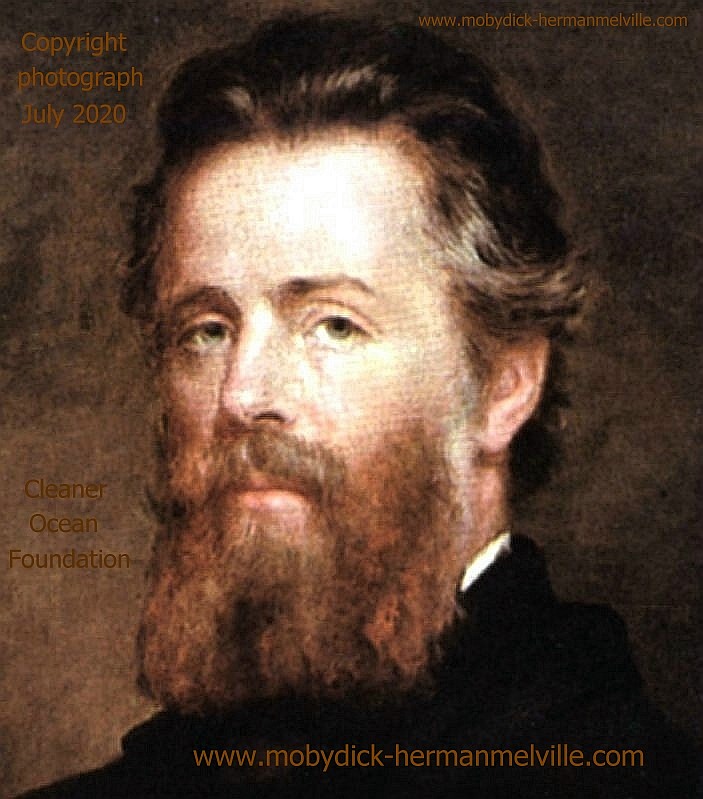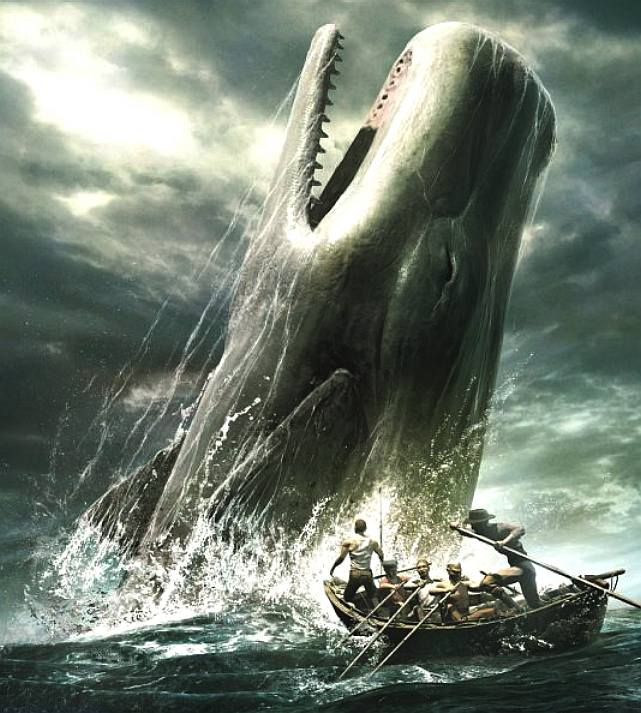
Herman
Melville was the author of a story about what we'd now consider an illegal activity,
the commercial hunting of whales for oil and meat. Whaling is still
carried out by Japan, Iceland and Canada, among other nations, though
most nations voluntarily abstain in the interests of conserving these
magnificent animals - as per International
Whaling Commission guidelines.
Back <<<
CHAPTER 58. Brit.
Steering north-eastward from the Crozetts, we fell in with vast meadows of brit, the minute, yellow substance, upon which the Right Whale largely feeds. For leagues and leagues it undulated round us, so that we seemed to be sailing through boundless fields of ripe and golden wheat.
On the second day, numbers of Right Whales were seen, who, secure from the attack of a Sperm Whaler like the Pequod, with open jaws sluggishly swam through the brit, which, adhering to the fringing fibres of that wondrous Venetian blind in their mouths, was in that manner separated from the water that escaped at the lip.
As morning mowers, who side by side slowly and seethingly advance their scythes through the long wet grass of marshy meads; even so these monsters swam, making a strange, grassy, cutting sound; and leaving behind them endless swaths of blue upon the yellow sea.*
*That part of the sea known among whalemen as the "Brazil Banks" does not bear that name as the Banks of Newfoundland do, because of there being shallows and soundings there, but because of this remarkable meadow-like appearance, caused by the vast drifts of brit continually floating in those latitudes, where the Right Whale is often chased.
But it was only the sound they made as they parted the brit which at all reminded one of mowers. Seen from the mast-heads, especially when they paused and were stationary for a while, their vast black forms looked more like lifeless masses of rock than anything else. And as in the great hunting countries of India, the stranger at a distance will sometimes pass on the plains recumbent elephants without knowing them to be such, taking them for bare, blackened elevations of the soil; even so, often, with him, who for the first time beholds this species of the leviathans of the sea. And even when recognised at last, their immense magnitude renders it very hard really to believe that such bulky masses of overgrowth can possibly be instinct, in all parts, with the same sort of life that lives in a dog or a horse.
Indeed, in other respects, you can hardly regard any creatures of the deep with the same feelings that you do those of the shore. For though some old naturalists have maintained that all creatures of the land are of their kind in the sea; and though taking a broad general view of the thing, this may very well be; yet coming to specialties, where, for example, does the ocean furnish any fish that in disposition answers to the sagacious kindness of the dog? The accursed shark alone can in any generic respect be said to bear comparative analogy to him.
But though, to landsmen in general, the native inhabitants of the seas have ever been regarded with emotions unspeakably unsocial and repelling; though we know the sea to be an everlasting terra incognita, so that Columbus sailed over numberless unknown worlds to discover his one superficial western one; though, by vast odds, the most terrific of all mortal disasters have immemorially and indiscriminately befallen tens and hundreds of thousands of those who have gone upon the waters; though but a moment's consideration will teach, that however baby man may brag of his science and skill, and however much, in a flattering future, that science and skill may augment; yet for ever and for ever, to the crack of doom, the sea will insult and murder him, and pulverize the stateliest, stiffest frigate he can make; nevertheless, by the continual repetition of these very impressions, man has lost that sense of the full awfulness of the sea which aboriginally belongs to it.
The first boat we read of, floated on an ocean, that with Portuguese vengeance had whelmed a whole world without leaving so much as a widow. That same ocean rolls now; that same ocean destroyed the wrecked ships of last year. Yea, foolish mortals, Noah's flood is not yet subsided; two thirds of the fair world it yet covers.
Wherein differ the sea and the land, that a miracle upon one is not a miracle upon the other? Preternatural terrors rested upon the Hebrews, when under the feet of Korah and his company the live ground opened and swallowed them up for ever; yet not a modern sun ever sets, but in precisely the same manner the live sea swallows up ships and crews.
But not only is the sea such a foe to man who is an alien to it, but it is also a fiend to its own off-spring; worse than the Persian host who murdered his own guests; sparing not the creatures which itself hath spawned. Like a savage tigress that tossing in the jungle overlays her own cubs, so the sea dashes even the mightiest whales against the rocks, and leaves them there side by side with the split wrecks of ships. No mercy, no power but its own controls it. Panting and snorting like a mad battle steed that has lost its rider, the masterless ocean overruns the globe.
Consider the subtleness of the sea; how its most dreaded creatures glide under water, unapparent for the most part, and treacherously hidden beneath the loveliest tints of azure. Consider also the devilish brilliance and beauty of many of its most remorseless tribes, as the dainty embellished shape of many species of sharks. Consider, once more, the universal cannibalism of the sea; all whose creatures prey upon each other, carrying on eternal war since the world began.
Consider all this; and then turn to this green, gentle, and most docile earth; consider them both, the sea and the land; and do you not find a strange analogy to something in yourself? For as this appalling ocean surrounds the verdant land, so in the soul of man there lies one insular Tahiti, full of peace and joy, but encompassed by all the horrors of the half known life. God keep thee! Push not off from that isle, thou canst never return!
Next
>>>
BOOK
CHAPTERS
CHAPTER 1. Loomings.
CHAPTER
2. The Carpet-Bag.
CHAPTER
3. The Spouter-Inn.
CHAPTER
4. The Counterpane.
CHAPTER
5. Breakfast.
CHAPTER
6. The Street.
CHAPTER
7. The Chapel.
CHAPTER
8. The Pulpit.
CHAPTER
9. The Sermon.
CHAPTER
10. A Bosom Friend.
CHAPTER
11. Nightgown.
CHAPTER
12. Biographical.
CHAPTER
13. Wheelbarrow.
CHAPTER
14. Nantucket.
CHAPTER
15. Chowder.
CHAPTER
16. The Ship.
CHAPTER
17. The Ramadan.
CHAPTER
18. His Mark.
CHAPTER
19. The Prophet.
CHAPTER
20. All Astir.
CHAPTER
21. Going Aboard.
CHAPTER
22. Merry Christmas.
CHAPTER
23. The Lee Shore.
CHAPTER
24. The Advocate.
CHAPTER
25. Postscript.
CHAPTER
26. Knights and Squires.
CHAPTER
27. Knights and Squires.
CHAPTER
28. Ahab, Captain.
CHAPTER
29. Enter Ahab; to Him, Stubb.
CHAPTER
30. The Pipe.
CHAPTER
31. Queen Mab.
CHAPTER
32. Cetology.
CHAPTER
33. The Specksnyder.
CHAPTER
34. The Cabin-Table.
CHAPTER
35. The Mast-Head.
CHAPTER
36. The Quarter-Deck.
CHAPTER
37. Sunset.
CHAPTER
38. Dusk.
CHAPTER
39. First Night Watch.
CHAPTER
40. Midnight, Forecastle.
CHAPTER
41. Moby Dick.
CHAPTER
42. The Whiteness of The Whale.
CHAPTER
43. Hark!
CHAPTER
44. The Chart.
CHAPTER
45. The Affidavit.
CHAPTER
46. Surmises.
CHAPTER
47. The Mat-Maker.
CHAPTER
48. The First Lowering.
CHAPTER
49. The Hyena.
CHAPTER
50. Ahab's Boat and Crew. Fedallah.
CHAPTER
51. The Spirit-Spout.
CHAPTER
52. The Albatross.
CHAPTER
53. The Gam.
CHAPTER
54. The Town-Ho's Story.
CHAPTER
55. Of the Monstrous Pictures of Whales.
CHAPTER
56. Of the Less Erroneous Pictures of Whales, and the True
CHAPTER
57. Of Whales in Paint; in Teeth; in Wood; in Sheet-Iron; in
CHAPTER
58. Brit.
CHAPTER
59. Squid.
CHAPTER
60. The Line.
CHAPTER
61. Stubb Kills a Whale.
CHAPTER
62. The Dart.
CHAPTER
63. The Crotch.
CHAPTER
64. Stubb's Supper.
CHAPTER
65. The Whale as a Dish.
CHAPTER
66. The Shark Massacre.
CHAPTER
67. Cutting In
CHAPTER
69. The Funeral.
CHAPTER
70. The Sphynx.
CHAPTER
71. The Jeroboam's Story.
CHAPTER
72. The Monkey-Rope.
CHAPTER
73. Stubb and Flask Kill a Right Whale; and Then Have a Talk
CHAPTER
74. The Sperm Whale's Head—Contrasted View.
CHAPTER
75. The Right Whale's Head—Contrasted View.
CHAPTER
76. The Battering-Ram.
CHAPTER
77. The Great Heidelburgh Tun.
CHAPTER
78. Cistern and Buckets.
CHAPTER
79. The Prairie.
CHAPTER
80. The Nut.
CHAPTER
81. The Pequod Meets The Virgin.
CHAPTER
82. The Honour and Glory of Whaling.
CHAPTER
83. Jonah Historically Regarded.
CHAPTER
84. Pitchpoling.
CHAPTER
85. The Fountain.
CHAPTER
86. The Tail.
CHAPTER
87. The Grand Armada.
CHAPTER
88. Schools and Schoolmasters.
CHAPTER
89. Fast-Fish and Loose-Fish.
CHAPTER
90. Heads or Tails.
CHAPTER
91. The Pequod Meets The Rose-Bud.
CHAPTER
92. Ambergris.
CHAPTER
93. The Castaway.
CHAPTER
94. A Squeeze of the Hand.
CHAPTER
95. The Cassock.
CHAPTER
96. The Try-Works.
CHAPTER
97. The Lamp.
CHAPTER
98. Stowing Down and Clearing Up.
CHAPTER
99. The Doubloon.
CHAPTER
100. Leg and Arm.
CHAPTER
101. The Decanter.
CHAPTER
102. A Bower in the Arsacides.
CHAPTER
103. Measurement of The Whale's Skeleton.
CHAPTER
104. The Fossil Whale.
CHAPTER
105. Does the Whale's Magnitude Diminish?—Will He Perish?
CHAPTER
106. Ahab's Leg.
CHAPTER
107. The Carpenter.
CHAPTER
108. Ahab and the Carpenter.
CHAPTER
109. Ahab and Starbuck in the Cabin.
CHAPTER
110. Queequeg in His Coffin.
CHAPTER
111. The Pacific.
CHAPTER
112. The Blacksmith.
CHAPTER
113. The Forge.
CHAPTER
114. The Gilder.
CHAPTER
115. The Pequod Meets The Bachelor.
CHAPTER
116. The Dying Whale.
CHAPTER
117. The Whale Watch.
CHAPTER
118. The Quadrant.
CHAPTER
119. The Candles.
CHAPTER
120. The Deck Towards the End of the First Night Watch.
CHAPTER
121. Midnight.—The Forecastle Bulwarks.
CHAPTER
122. Midnight Aloft.—Thunder and Lightning.
CHAPTER
123. The Musket.
CHAPTER
124. The Needle.
CHAPTER
125. The Log and Line.
CHAPTER
126. The Life-Buoy.
CHAPTER
127. The Deck.
CHAPTER
128. The Pequod Meets The Rachel.
CHAPTER
129. The Cabin.
CHAPTER
130. The Hat.
CHAPTER
131. The Pequod Meets The Delight.
CHAPTER
132. The Symphony.
CHAPTER
133. The Chase—First Day.
CHAPTER
134. The Chase—Second Day.
CHAPTER
135. The Chase.—Third Day.
Epilogue

Moby
Dick is the antogonist in this story of a great white 'bull' sperm whale that fought back at
whalers who tried to harpoon him.
The idea came to
Herman Melville after
he spent time on a commercial whaler, where stories abounded of the
sinking of the Essex in 1821 and Mocha
Dick, a giant sperm whale that sank around 20 ships, before being
harpooned in 1838.
Herman
realised how fixated the sailors became, and he also became with the
thought that there was a whale that nobody could catch, that represented
a real risk to the whalers hunting whales, in that it was more sport
than commercial operations.
Without
any doubt this is one of the greatest novels coming out of America at
this time and way off the beaten track, making it so interesting,
reflecting the state of whaling and the economic importance in the
developing the nation - giving the general public a taste of something
adventurous that most people never think about.
Many
films and graphic novel adaptations have been inspired by the writings
of Herman Melville, from Marvel
and Disney
comics with good cause.
One
such production in 2020 is a graphic novel about a giant humpback whale
called Kulo
Luna, that sinks a modern whaling boat, much as depicted in Herman
Melville's Moby
Dick, except that is this day and age whales have explosive harpoons
to contend with, and sonar, from which there is no escape.
Please use our
A-Z INDEX to
navigate this site

